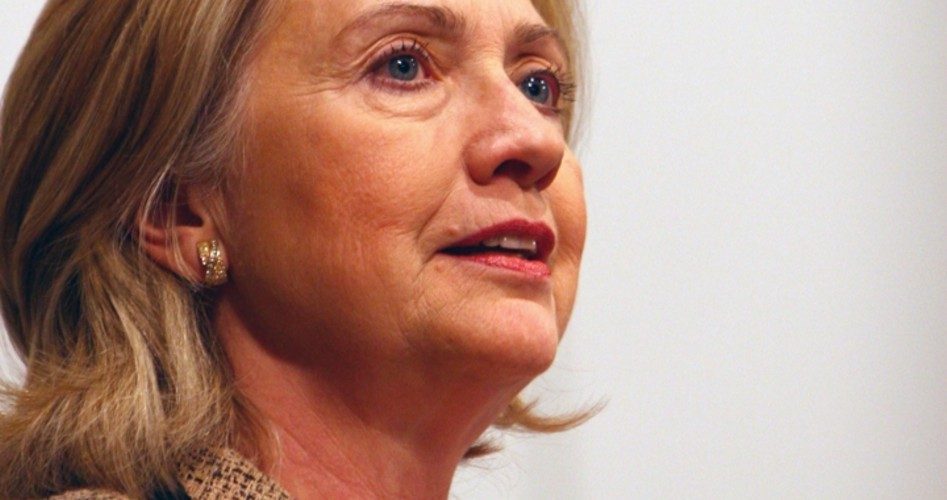
When consulting firm Simpson Thacher & Bartlett, better known simply as Simpson Thacher, completed its corporate review of the Clinton Foundation earlier this month, their conclusions were picked up by the New York Times. Authors Nicholas Confessore and Amy Chozick gently chided the Clintons for running a money machine allegedly designed to “strengthen the capacity of people throughout the world to meet the challenges of global interdependence” but which suffers instead from poor financial management and conflicts of interest. Nowhere in either that report or in the Times’ rendition of it was any direct mention of its new real purpose: to provide a launching pad for Hillary’s (shown) insatiable and unquenchable desire to be the next president of the United States.
Based on nearly 40 interviews with staff members of the foundation over a two-week period in November 2011, Simpson Thacher made some modest recommendations: Expand the board of directors, hire someone who can work full time at running the place, and keep an eye on potential conflicts of interest. It recommended raising an endowment fund large enough to meet its operating expenses independent of Bill Clinton’s ability (he had open heart surgeries in 2004, 2005, and 2010) to give enough speeches, often at $500,000 a pop, to keep the place running. It noted that for an operation that generates hundreds of millions in revenues ($214 million in 2012 alone), Simpson Thacher couldn’t explain how it could possibly lose money, but it did, running a deficit of $40 million in 2010 and 2011 and losing another $8 million last year.
The authors noted that from its beginning in 2001 the foundation has been run by, and has handsomely profited, an entire playbill of Clinton cronies and supporters, including Doug Band, who created the Clinton Global Initiative (CGI); six-figure donor John Catsimatidis; Ira Magaziner, the architect of Hillary’s failed “Hillarycare” legislation; and Bruce Lindsey, current CEO of the foundation.
The authors wrote:
[No conflict of interest has] drawn more scrutiny … than Teneo, a firm co-founded in 2009 by Mr. Band, described by some as a kind of surrogate son to Mr. Clinton. Aspiring to merge corporate consulting, public relations and merchant banking in a single business, Mr. Band poached executives from Wall Street, recruited other Clinton aides to join as employees or advisers and set up shop in a Midtown office formerly belonging to one of the country’s top hedge funds….
Teneo worked on retainer, charging [the foundation] monthly fees as high as $250,000, according to current and former clients. The firm recruited clients who were also Clinton Foundation donors, while Mr. Band … encouraged others to become new foundation donors. Its marketing materials highlighted Mr. Band’s relationship with Mr. Clinton and the Clinton Global Initiative, where Mr. Band sat on the board of directors through 2011 and remains an adviser.
Some Clinton aides and foundation employees began to wonder where the foundation ended and Teneo began.
And that was just the beginning. As of 2008, the Clinton Foundation had raised at least $46 million from Saudi Arabia, Kuwait, Qatar, Brunei, Oman, and other foreign governments — the same governments with which Hillary would be dealing as secretary of state.
Then there’s Robert Congel, who was rewarded with significant “federal assistance” in developing some real estate in New York City following his donation of $100,000 to the foundation.
The former president successfully brushed aside concerns about his foundation running in the red by explaining: “When someone makes a multi-year commitment to the Foundation, we have to report it in the year it was made. In 2005 and 2006 as a result of multi-year commitments, the Foundation reported a surplus of $102,800,000 though we collected nowhere near that. In later years, as the money came in … we were required to report the spending but not the cash inflow.”
In their conclusion, the authors touched briefly on the transformation of the Clinton Foundation into a tax-exempt financial springboard for Hillary:
Mrs. Clinton’s personal staff of roughly seven people — including Huma Abedin, wife of the New York mayoral candidate Anthony D. Weiner — will soon relocate from a cramped Washington office to the foundation’s headquarters.
They will work on organizing Mrs. Clinton’s packed schedule of paid speeches [her usual honorarium is $200,000] to trade groups and awards ceremonies and assist in the research and writing of Mrs. Clinton’s memoir about her time at the State Department, to be published by Simon & Schuster next summer.
In case the implication wasn’t clear enough, the Times asked Maureen Dowd to clarify. In the paper’s Sunday Review, Dowd explained:
We are supposed to believe that every dollar given to a Clinton is a dollar that improves the world. But is it? Clintonworld is a galaxy where personal enrichment and political advancement blend seamlessly, and where a cast of jarringly familiar characters pad their pockets every which way to Sunday. [Emphasis added.]
It took Robert Higgs, the former White House secretary, to lay it all out in black and white:
Having a place such as this for a platform gives her a great launching pad into 2016. It gives her, quite frankly, a great place with which to create … the message she would use should she decide to run.
The newly revised and upgraded Clinton Foundation will now serve as the Great Whitewash, depending upon citizens’ short memories about Hillary’s past to help her with her bid for the presidency. Those memories include a history of corruption and deceit, which include Whitewater, Travelgate, her remarkably successful dabble into cattle futures (turning $1,000 into $100,000 in 10 months), and the strange death of Vince Foster.
A graduate of Cornell University and a former investment advisor, Bob is a regular contributor to The New American magazine and blogs frequently at www.LightFromTheRight.com, primarily on economics and politics. He can be reached at [email protected].



